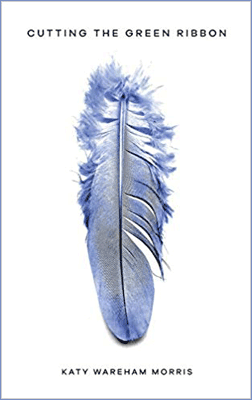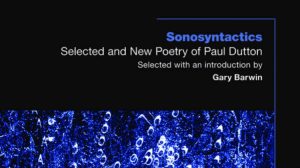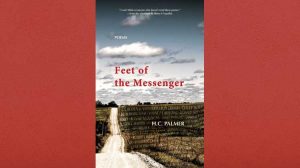Cutting the Green Ribbon by Katy Wareham Morris / Hesterglock Press / 9781999915346 / 45 pages / 2018
 Cutting the Green Ribbon arrives at a turning point in 21st-century arts, with women emerging triumphant from a subjugating demographic of muzzling inequality in the arts, raising their voices anthemic from abuse scandals to setting new examples of excellence in poetry such as Liz Berry, Wendy Pratt, and the Landay poets of Afghanistan. Katy Wareham Morris steps forward with her new fearless collection, Cutting the Green Ribbon, which is a gnarly and assertive suite of poems that dismantle the male constructs of weakness they see in women — and, without getting defensive, instead rebuilds a view of modern women from the outlook and experiences of a sexual and sensual woman who is liberated by ideals born from living a life no different in the freedoms a man has. KWM takes advantage of this and lingers like a Lana Del Rey song sculpturing old clay into Liberty sticking two fingers up to the world.
Cutting the Green Ribbon arrives at a turning point in 21st-century arts, with women emerging triumphant from a subjugating demographic of muzzling inequality in the arts, raising their voices anthemic from abuse scandals to setting new examples of excellence in poetry such as Liz Berry, Wendy Pratt, and the Landay poets of Afghanistan. Katy Wareham Morris steps forward with her new fearless collection, Cutting the Green Ribbon, which is a gnarly and assertive suite of poems that dismantle the male constructs of weakness they see in women — and, without getting defensive, instead rebuilds a view of modern women from the outlook and experiences of a sexual and sensual woman who is liberated by ideals born from living a life no different in the freedoms a man has. KWM takes advantage of this and lingers like a Lana Del Rey song sculpturing old clay into Liberty sticking two fingers up to the world.
This collection is badass and strongest when it is sure of itself in many moments of shrewd awareness of carnal power and the differentials of fucking, sensual loving, consensual giving and non-consensual taking in relationships and of the power the body holds over the mind and vice versa. You can sense the moments when KWM is vulnerable in disclosure and other moments when she brilliantly exposes the elephant in the room and goes all out exposing relationships, men, women, sexual dynamics, the primal, the controlled primal and all with a declaration of being human which is at times intoxicating to see such as “From Peaches”
Extract
This song leapt from my vulva,
fell straight in your mouth;
you salivate, scream for another —
fuck thisYou kiss the next one,
It spreads — another dick
hard, my lips done.
The Green Ribbon has an interesting origin. It seems to have been founded about the year 1675 as a resort for members of the political party hostile to the court. As these associates were in the habit of wearing in their hats a bow, or bob, of green ribbon, as a distinguishing badge useful for the purpose of mutual recognition in street brawls, the name of the club was changed. The poem above and others in the book redress a balance of power, equality and dominance and sex is often used as a device of control whether that is applied tenderly, brutally or manipulatively.
The poem above shows pride and ownership of sexuality and sensuality — that song from the vulva is reminiscent of whale sonar in all its secret maps finding its way through the waters below the surface to effectively call something back home. Is that something womanhood? I thought many times of all the historic women writers who were forced to use male pseudonyms in order to be accepted.
This is KWM’s most impressive achievement in this collection — that it shouts in poems, whispers in prose and takes its place as a seminal piece of 21st-century “Me too” commentary alongside Deborah Alma’s #MeToo anthology. The only criticism of this book is that the compilation sequence should have been for me in reverse as the voice grows more and more confident and risqué in the mid-end act.
I hope KWM asserts more confidence in her next collection, for she is a quality writer — brave and exciting to read. She is far from a supporting act and has the potential to be a leading writer in British poetry. She is deserving of high praise for a kick-ass collection that is recommended.




Cy Lester says
Make it new! Catching up with the Old White Brain-box!